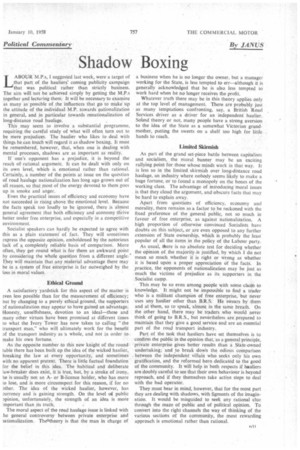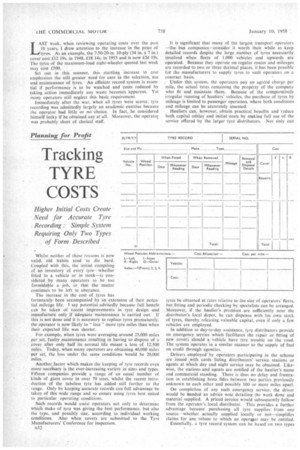Shadow Boxing
Page 71

Page 72

If you've noticed an error in this article please click here to report it so we can fix it.
LABOUR M.P.s, I suggested last week, were a target of that part of the hauliers' corning publicity campaign that was political rather than strictly business. The aim will not be achieved simply by getting the IVI.P.s together and lecturing them. It will be necessary to examine as many as' possible of the influences that go to make up the attitude of the individual M.P. towards nationalization in general, and in particular towards Tenationalization of
long-distance road haulage. .
This . may seem to involve a substantial programme, requiring the careful study of what will often turn out to be mere prejudices. The haulier who likes to deal with things he can touch will regard it as shadow boxing. It must be remembered, however, that, when one is dealing with mental processes, shadows are as important as reality.
If one's opponent has a prejudice, it is beyond the reach of-rational argumeht. It can be dealt with only on its own level, which is emotional rather than rational. Certainly, a number of the points at issue on the question of road haulage nationalization has long ago grown out of all reason, so that most of the energy devoted to them goes up in smoke and anger.
Even the practical issues of efficiency and economy have not succeeded in rising above the emotional level. Because the facts speak too loudly to be ignored, there is almost general agreement that both efficiency and economy thrive better under free enterprise, and especially in a competitive environment. .
Socialist speakers can hardly he expected to agree with this as a plain statement' of fact. They will sometimes express the opposite opinion, emboldened by the notorious lack of a completely reliable basis of comparison. More often, they get -round what is for them an awkward point by considering the whole question from a different angle: They will maintain that any material advantage there may be in a system of free enterprise is far outweighed by the loss in moral values.
Ethical Ground A satisfactory yardstick for this aspect of the matter is even less possible than for the measurement of efficiency; but by changing to a purely ethical ground, the supporters Df nationalization may appear to have gained an advantage. Elonesty, unselfishness, devotion to an ideal—these and many other virtues have been promised at different times to what the Ivory Tower has now taken to calling "the transport man," who will ultimately work for the benefit af the transport industry as a whole, and not in order to make his own fortune.
As the opposite number to this new knight of the round: table there has been built up the idea of the wicked haulier,: breaking the law at every opportunity, and sometimes with no apparent pretext. There is little factual foundation for the belief in this idea. The habitual and deliberate law-breaker does exist, it is true, but, by a stroke of irony, he is usually not an Aor B-licence holder, who has more to lose, and is more circumspect for this reason, if for no other. The idea of the wicked haulier, however, has currency and is gaining strength. On the level of public )pinion, unfortunately, the strength of an idea is more [mportant than its truth.
The moral aspect of the road haulage -issue is linked with he general controversy between private enterprise and iationalization. Theotheory is that the man in charge of a business when he is no longer the owner, but a manager working for the State, is less tempted to err—although it is generally acknowledged that he is also less tempted to work hard when he no longer receives the profit.
Whatever truth there may be in this theory applies only at the top level of management. There are probably just as many temptations confronting, say, a British Road Services driver as a driver for an independent haulier. Sand theory or not, many people have a strong aversion to the idea of the State as a somewhat Victorian grandmother, putting the sweets on a shelf too high for little hands to reach.
Limited Skirmish
As part of the grand set-piece battle between capitalism and socialism, the moral banner may be an exciting rallying point for those whose minds work in that way. It is less so in the limited skirmish over long-distance road haulage, an industry where nobody seems likely to make a huge fortune, or to found a monopoly on the bones of the working class. The advantage of introducing Moral issues is that they cloud the argument, and obscure facts that may be hard to explain away.
Apart from questions of efficiency, economy and morality, there remains as a factor to be reckoned with the fixed preference of the general public, not so much in favour of free enterprise, as against nationalization. A high proportion of otherwise convinced Socialists have doubts on this subject, or are even opposed to any further extension of State ownership, which is probably the least popular of all the items in the policy of the Labour party.
As usual, there is no absolute test for deciding whether the oPinion of the majority,is justified, by which I do not mean so much whether it is right or wrong as whether it is based upon a proper appreciation of the facts: In practice, the opponents of nationalization may be just as • much the victims of prejudice as its supporters in the Socialist carpp.
This may be so even among people with some claim to knowledge. It might not be impossible to find a trader who is a militant champion of free enterprise, but never uses any haulier other than B.R.S. He swears by them and at them, so to speak, almost in the same breath. On the other hand, there may be traders who would never think of going to B.R.S., but nevertheless are prepared to maintain that they give a good service and are an essential part of the road transport industry.
Part of the task that hauliers have set themselves is to confirm the public in the opinion that,-as a general principle, private enterprise gives better results than a State-owned undertaking; and to break doWn the odious comparison between the independent villain who seeks only his own gratification, and the reformed hero dedicated to the good of the community. It will help in both respects if hauliers are doubly careful to see that their own behaviour is beyond reproach, and if they themselves take active steps to deal with the bad operator.
They must bear in mind, however, that for the most part they are dealing with shadows, with figments of the imagination. It would be misguided to seek any rational clue through the maze of public and of political opinion. To convert into the right channels the way of thinking of the various sections of the community, the most rewarding approach is emotional rather than rational.
LAST week, when reviewing operating costs over the past 10 years, I drew attention to the increase in the price of tyres. As an example, the 7,50-20-in. 10-ply (34 in. x 7 in.) cover cost £12 19s. in 1948, £18 14s. in 1953 and is now £24 19s. The tyres of the maximum-load eight-wheeler quoted last week may cost £500.
Set out in this manner, this startling increase in cost emphasizes the still greater need for care in the selection, use and maintenance of tyres. An efficient record system is essential if performance is to he watched and costs reduced by taking action immediately any waste becomes apparent. Yet many operators still neglect this basic requirement. Immediately after the war, when all tyres were scarce, tyre recording was admittedly largely an academic exercise because the operator had little or no choice. In fact, he considered himself lucky if he obtained any at all. Moreover, the operatol: was probably short of clerical staff. It is significant that many of the largest transport operators —the bus companies—consider it worth their while to keep detailed records despite the large nuffiber of tyres necessarily involved when fleets of 1,000 vehicles and upwards are operated. Because they operate on regular routes and mileages are recorded to two or three decimal places, it has been possible for the manufacturers to supply tyres to such operators on a contract basis.
. Under this system, the operators pay an agreed charge per mile, the actual tyres remaining the property of the company who fit and maintain them. Because of the comparatively irregular running of hauliers' vehicles, the purchase of tyres by mileage is limited to passenger operation, where both conditions and mileage can be atcurately assessed.
Hauliers can, however, obtain practical benefits and reduce both capital o6tlay and initial costs by making full use of the service offered -by the larger tyre distributors. Not only can
















































































































